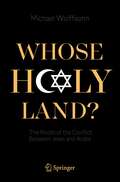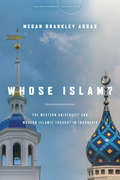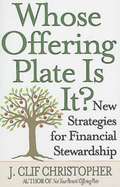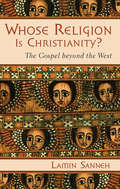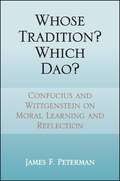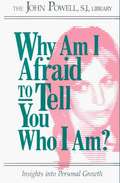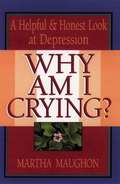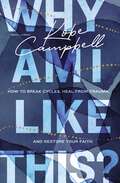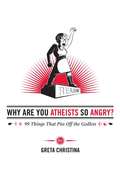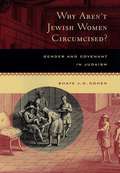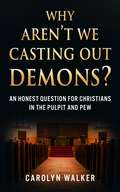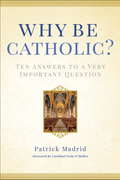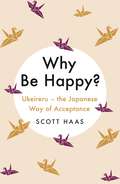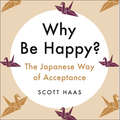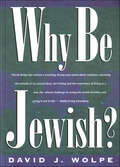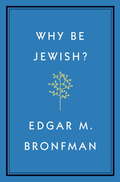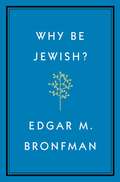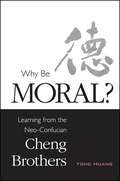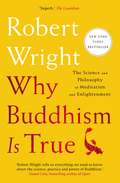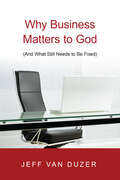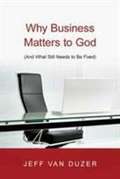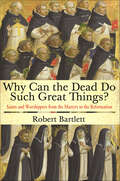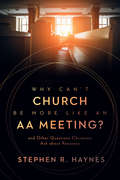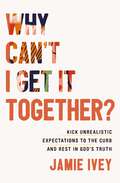- Table View
- List View
Whose Holy Land?: The Roots of the Conflict Between Jews and Arabs
by Michael WolffsohnThis book explains the historical roots of the conflict between Jews and Arabs, which has lost none of its explosiveness to the present day, in a comprehensive and easy-to-understand manner. The question of who owns the Holy Land is more relevant today than ever. The debates on this topic are often characterized by ignorance and strong emotions, while partiality and power interests still obscure the view on the political situation in the Middle East. Shaking up old myths and prejudices, this book presents an overall historical as well as political analysis of the Jewish, Christian, and Muslim structures, actors, and actions from the very beginning to this very day, as well as a topical analysis. It combines history with theology and political science. Thus, the book is a must-read for scholars and students of political science, history, and international relations, as well as policy-makers, interested in a better understanding of the historical background and current political situation in the Middle East.
Whose Islam?: The Western University and Modern Islamic Thought in Indonesia (Encountering Traditions)
by Megan Brankley AbbasIn this incisive new book, Megan Brankley Abbas argues that the Western university has emerged as a significant space for producing Islamic knowledge and Muslim religious authority. For generations, Indonesia's foremost Muslim leaders received their educations in Middle Eastern madrasas or the archipelago's own Islamic schools. Starting in the mid-twentieth century, however, growing numbers traveled to the West to study Islam before returning home to assume positions of political and religious influence. Whose Islam? examines the far-reaching repercussions of this change for major Muslim communities as well as for Islamic studies as an academic discipline. As Abbas details, this entanglement between Western academia and Indonesian Islam has not only forged powerful new transnational networks but also disrupted prevailing modes of authority in both spheres. For Muslim intellectuals, studying Islam in Western universities provides opportunities to experiment with academic disciplines and to reimagine the faith, but it also raises troubling questions about whether and how to protect the Islamic tradition from Western encroachment. For Western academics, these connections raise pressing ethical questions about their own roles in the global politics of development and Islamic religious reform. Drawing on extensive archival research from around the globe, Whose Islam? provides a unique perspective on the perennial tensions between insiders and outsiders in religious studies.
Whose Offering Plate Is It?: New Strategies for Financial Stewardship
by J. Clif ChristopherIn Not Your Parents' Offering Plate, Clif Christopher challenged churches and pastors to take a lesson from the leaders of not-for-profit organizations: if you want people to give to your church, first offer them a compelling vision of the good that their giving will accomplish. The book encouraged an entire culture change for many in the Christian community in how they viewed the offering plate. It also unleashed a barrage of questions on specifically how to create this new culture while maintaining the foundations of one's faith tradition and mission.In this sequel, Christopher responds to these questions in the same forthright manner that he originally laid forth his propositions. He offers simple, strategic advice on such difficult questions as:“Exactly how do I go about gaining access to the donor records when my church has prohibited it for a hundred years?”“How do I explain a meeting with just those who are strong givers without alienating those who are not?”“How can we advocate online giving without encouraging some to abuse their credit cards?”“What should letters to different giving constituencies look like?”
Whose Religion Is Christianity?: The Gospel beyond the West
by Lamin SannehMany historians of religion now recognize that Christianity is a global faith whose most vibrant expression and growth are found today in the non-Western world. But no one explores this reality and its implications for modern life with the depth of learning and personal insight of Lamin Sanneh.This book is unique in the literature of world Christianity, not least for its novel structure. Sanneh's engaging narrative takes the form of a self-interview in which he asks questions about the cross-cultural expansion of Christianity and provides insightful answers and meaningful predictions about the future. This technique also allows Sanneh to track developments in world Christianity even while giving attention to the responses and involvement of indigenous peoples around the world.Sanneh's own background and lifelong involvement with non-Western cultures bring a richness of perspective not found in any other book on world Christianity. For example, Sanneh highlights what is distinctive about Christianity as a world religion, and he offers a timely comparison of Christianity with Islam's own missionary tradition. The book also gives pride of place to the recipients of the Christian message rather than to the missionaries themselves. Indeed, Sanneh argues here that the gospel is not owned by the West and that the future of the tradition lies in its "world" character.Literate, relevant, and highly original, Whose Religion Is Christianity? presents a stimulating new outlook on faith and culture that will interest a wide range of readers.
Whose Tradition? Which Dao?: Confucius and Wittgenstein on Moral Learning and Reflection (SUNY series in Chinese Philosophy and Culture)
by James F. PetermanIn an incisive work of comparative philosophy, James F. Peterman considers the similarities between early Chinese ethicist Confucius and mid-twentieth century philosopher Ludwig Wittgenstein. Their enduring legacies rest in no small part on projects to restore humanity to healthy ways of living and thinking. Confucius offers a method of answering ethical questions designed to get his interlocutors further along on the Dao, the path of right living. Struggling with his own forms of unhealthy philosophical confusion, Wittgenstein provides a method of philosophical therapy designed to help one come into agreement with norms embedded in our forms of life and speech. Highlighting similarities between the two philosophers, Peterman shows how Wittgensteinian critique can benefit from Confucian inquiry and how Confucian practice can benefit from Wittgensteinian investigations. Furthermore, in presenting a way to understand Confucius's Dao as concrete language games and forms of life, and Wittgenstein's therapeutic interventions as the most fitting philosophical orientation toward early Confucian ethics, Peterman offers Western thinkers a new, sophisticated understanding of Confucius as a philosopher.
Why Am I Afraid to Tell You Who I am?
by John PowellThere are many reasons for being afraid to tell others who we really are. We're often taught to put on an act when around other people. This book shows you how you can overcome the fear of revealing your true self to others.
Why Am I Crying?: A Helpful & Honest Look at Depression
by Martha MaughonAn honest, helpful, I-have-been-there look at depression. Martha Maughon writes encouragingly of God's grace and human weakness.
Why Am I Like This?: How to Break Cycles, Heal from Trauma, and Restore Your Faith
by Kobe CampbellWhy does our past pain continue to affect our present?Though many of us can point to patterns of brokenness in our lives, we don&’t know why they're there. No matter how hard we work, we can&’t seem to outrun the very things that break our hearts. That's because our everyday setbacks are rooted in our unaddressed wounds.In Why Am I Like This? seminary-trained, licensed trauma therapist Kobe Campbell helps us understand why it&’s so hard to break these patterns as she offers us a deeper understanding of how our past shapes our present. With tender wisdom, rare vulnerability, and profound honesty, Kobe reminds each reader that they&’re not alone, empowering them to step into healing with evidence-based, faith-filled coping skills and resources.In Why Am I Like This?, you will:gain an understanding of what trauma and healing really are,explore the roots of your dysfunctional patterns,learn how your trauma shows up in your everyday life, andfind trauma-informed, faith-based coping mechanisms to heal your mind and deepen your intimacy with God.Kobe marries theological insight with therapeutic principles to give readers the tools and insights needed to begin their journey of restoration.
Why Are You Atheists So Angry?: 99 Things That Piss Off The Godless
by Greta ChristinaWhy are atheists angry? Is it because they're selfish, joyless, lacking in meaning, and alienated from God? Or is it because they have legitimate reasons to be angry--and are ready to do something about it? Armed with passionate outrage, absurdist humor, and calm intelligence, popular blogger Greta Christina makes a powerful case for outspoken atheist activism, and explains the empathy and justice that drive it. This accessible, personal, down-to-earth book speaks not only to atheists, but also to believers who want to understand the so-called new atheism. Why Are You Atheists So Angry? drops a bombshell on the destructive force of religious faith—and gives a voice to millions of angry atheists.
Why Aren't Jewish Women Circumcised? Gender and Covenant in Judaism
by Shaye J. D. CohenWith a lively command of a wide range of Jewish sources--from the Bible and the Talmud to the legal and philosophical writings of the Middle Ages to Enlightenment thinkers and modern scholars--Shaye J. D. Cohen considers the varied responses to this provocative question and in the process provides the fullest cultural history of Jewish circumcision available.
Why Aren’t We Casting Out Demons?: An Honest Question for Christians in the Pulpit and Pew
by Carolyn WalkerAre you ready to rise in your God-ordained authority and deal a mighty blow to the enemy?In a world where spiritual battles rage, why do so many Christians remain powerless against the forces of darkness? Carolyn Walker’s “Why Aren’t We Casting Out Demons?” illuminates this critical issue, calling believers to rise in their God-given authority and bring deliverance to the suffering.Drawing from personal experiences and biblical study, Carolyn Walker uncovers a concerning reality: demonic spirits are actively assaulting people, yet many church leaders and congregants are unprepared, hesitant, or unwilling to confront them. This book challenges Christians to step into their role as spiritual warriors.As a seasoned pastor, Carolyn Walker has witnessed the church’s reluctance to tackle demon deliverance. She addresses common misconceptions, fears, and the often-ignored biblical mandate to cast out demons. This book is not just a critique but a roadmap for resurrecting this essential aspect of Christian ministry.Carolyn Walker equips readers with scriptural insights and practical steps to confront and expel demonic forces. By embracing this authority, Christians can transform their lives, families, churches, and communities.About the AuthorPastor Carolyn Walker is a minister of the gospel and a missionary. She has served in various countries including Haiti, Mexico, Santo Domingo, Honduras, Albania, Jamaica, Hong Kong, Singapore, and the Bahamas. She has been instrumental in building churches in Central America and financially supports the feeding of hundreds of children a day in Copan, Honduras.From 2002 to 2008, Pastor Carolyn was co-founder and co-pastor of Word of Faith Ministries in Sanford, Florida. After retiring as an Officer in the United States Air Force she served as a minister and pastor on staff at mega churches in Denver, Colorado and Orlando, Florida.
Why Be Catholic?: Ten Answers to a Very Important Question
by Patrick Madrid Cardinal Seán O'MalleyThe popular blogger and publisher of Envoy magazine offers 10 key reasons why he loves being Catholic (and you should too). Drawing heavily on poignant anecdotes from his own experience as a life-long Catholic born in 1960s, Madrid offers readers a way of looking at the Church--its members, teachings, customs, and history--from perspectives many may have never considered.Growing up Catholic during a time of great social and theological upheaval and transition, a time in which countless Catholics abandoned their religion in search of something else, Patrick Madrid learned a great deal about why people leave Catholicism and why others stay. This experience helped him gain many insights into what it is about the Catholic Church that some people reject, as well as those things that others treasure. Drawing upon Madrid's personal experiences, Why Be Catholic? offers a deeply personal, fact-based, rationale for why everyone should be Catholic or at least consider the Catholic Church in a new light.
Why Be Happy?: The Japanese Way of Acceptance
by Scott HaasThis book offers a path to well-being and satisfaction for the anxious and exhausted and anyone charmed by concepts such as hygge, ikigai, and wabi sabi. Psychologist Scott Haas spends much of his time in Japan, and with this book he provides a host of delightful examples of the way he has been made welcome, accepted and happy in this distant country, as well as many thought provoking and practical lessons which you can apply.WHY BE HAPPY? will help make your world a happier place by discovering a place of contentment and peace amid the chaos of modern life.
Why Be Happy?: The Japanese Way of Acceptance
by Scott HaasThis book offers a path to well-being and satisfaction for the anxious and exhausted and anyone charmed by concepts such as hygge, ikigai, and wabi sabi. Psychologist Scott Haas spends much of his time in Japan, and with this book he provides a host of delightful examples of the way he has been made welcome, accepted and happy in this distant country, as well as many thought provoking and practical lessons which you can apply.WHY BE HAPPY? will help make your world a happier place by discovering a place of contentment and peace amid the chaos of modern life.(P)2020 Hachette Audio
Why Be Jewish?
by David J. Wolpe"All beginnings require that you unlock new doors."--Rabbi Nachman of BratslavIn this short and inspiring text, Rabbi David J. Wolpe addresses all who seek to enlarge the spiritual side of their lives. For those considering a return to the faith of their forebears, for those drawn to conversion, Why Be Jewish? is a learned, graceful, and welcoming introduction beckoning readers into the heart of this venerable and enduring religion.
Why Be Jewish?: A Testament
by Edgar BronfmanThoughtful, piercing, and sincere, Why Be Jewish? is Edgar Bronfman's passionate testimonial to his own personal Jewish journey and the story of the Jewish people.This is the late Edgar Bronfman's clarion call to a generation of secular, disaffected and unaffiliated Jews, addressing the most critical question confronting Judaism worldwide.Completed in December 2013, just weeks before he passed away, Why Be Jewish? expresses Canadian billionaire and philanthropist Edgar Bronfman's awe, respect, and deep love for his faith and heritage. Bronfman walks readers through the major tenets and ideas in Jewish life, fleshing out their meaning and offering proof texts from the Jewish tradition, gleaned over his many years of study with some of the greatest teachers in the Jewish world. In Why Be Jewish?, with honest, poignancy, and passion, Bronfman shares insights learned from his own personal journey and makes a compelling case for the meaning and transcendence of a secular Judaism that is still steeped in deep moral values, authentic Jewish texts, and a focus on deed over creed or dogma.From the Hardcover edition.
Why Be Jewish?: A Testament
by Edgar BronfmanEdgar M. Bronfman's clarion call to a generation of secular, disaffected, and unaffiliated Jews, this book addresses the most critical question confronting Judaism worldwide. Completed in December 2013, just weeks before he passed away, WHY BE JEWISH? expresses Edgar Bronfman's awe, respect, and deep love for his faith and heritage. Bronfman walks readers through the major tenets and ideas in Jewish life, fleshing out their meaning and offering proof texts from the Jewish tradition gleaned over his many years of study with some of the greatest teachers in the Jewish world. With honesty, poignancy, and passion, Bronfman shares In WHY BE JEWISH? insights gleaned from his own personal journey and makes a compelling case for the meaning and transcendence of a secular Judaism that is still steeped in deep moral values, authentic Jewish texts, and a focus on deed over creed or dogma.
Why Be Moral?: Learning from the Neo-Confucian Cheng Brothers (SUNY series in Chinese Philosophy and Culture)
by Yong HuangYong Huang presents a new way of doing comparative philosophy as he demonstrates the resources for contemporary ethics offered by the Cheng brothers, Cheng Hao (1032–1085) and Cheng Yi (1033–1107), canonical neo-Confucian philosophers. Huang departs from the standard method of Chinese/Western comparison, which tends to interest those already interested in Chinese philosophy. While Western-oriented scholars may be excited to learn about Chinese philosophers who have said things similar to what they or their favored philosophers have to say, they hardly find anything philosophically new from such comparative work. Instead of comparing and contrasting philosophers, each chapter of this book discusses a significant topic in Western moral philosophy, examines the representative views on this topic in the Western tradition, identifies their respective difficulties, and discusses how the Cheng brothers have better things to say on the subject. Topics discussed include why one should be moral, how weakness of will is not possible, whether virtue ethics is self-centered, in what sense the political is also personal, how a moral theory can be of an antitheoretical nature, and whether moral metaphysics is still possible in this postmodern and postmetaphysical age.
Why Believe?
by Richard KoffarnusYou believe? Of course you do. Even an unbeliever believes something . But wouldn't you like to know more about believing? We asked Dick Koffarus to write a book for you, not for philosophers or theologians. This is it.
Why Buddhism is True: The Science and Philosophy of Meditation and Enlightenment
by Robert WrightFrom one of America&’s most brilliant writers, a New York Times bestselling journey through psychology, philosophy, and lots of meditation to show how Buddhism holds the key to moral clarity and enduring happiness.At the heart of Buddhism is a simple claim: The reason we suffer—and the reason we make other people suffer—is that we don&’t see the world clearly. At the heart of Buddhist meditative practice is a radical promise: We can learn to see the world, including ourselves, more clearly and so gain a deep and morally valid happiness. In this &“sublime&” (The New Yorker), pathbreaking book, Robert Wright shows how taking this promise seriously can change your life—how it can loosen the grip of anxiety, regret, and hatred, and how it can deepen your appreciation of beauty and of other people. He also shows why this transformation works, drawing on the latest in neuroscience and psychology, and armed with an acute understanding of human evolution. This book is the culmination of a personal journey that began with Wright&’s landmark book on evolutionary psychology, The Moral Animal, and deepened as he immersed himself in meditative practice and conversed with some of the world&’s most skilled meditators. The result is a story that is &“provocative, informative and...deeply rewarding&” (The New York Times Book Review), and as entertaining as it is illuminating. Written with the wit, clarity, and grace for which Wright is famous, Why Buddhism Is True lays the foundation for a spiritual life in a secular age and shows how, in a time of technological distraction and social division, we can save ourselves from ourselves, both as individuals and as a species.
Why Business Matters to God: (And What Still Needs to Be Fixed)
by Jeff Van DuzerJeff Van Duzer grew up thinking business was the source of much damage and evil in the world, the work of greedy capitalists polluting the environment. Thirty years later he was dean of a business school. In the course of that remarkable transformation, Van Duzer found cause for both hope and concern. He discovered many business people achieving a great deal of good for society as well as a lot of illegal and unethical behavior. Along the way he found some who thought that merely being honest and kind was what made business Christian. Others said they'd never ask pastors for business advice because they had no interest or experience in their work. After all, wasn't "full-time Christian service" what the church was all about? This book explores the nature and meaning of doing business and finds it calls for much more than most think. Van Duzer presents a profoundly Christian approach that integrates biblical studies with the disciplines of business and economics. Looking beyond the place of ethical principles and the character of the individual, Van Duzer displays a vision of business that contributes to the very purposes of God.
Why Business Matters to God: And What Still Needs to Be Fixed
by Jeff Van Duzer<p>Jeff Van Duzer grew up thinking business was the source of much damage and evil in the world, the work of greedy capitalists polluting the environment. Thirty years later he was dean of a business school. In the course of that remarkable transformation, Van Duzer found cause for both hope and concern. He discovered many business people achieving a great deal of good for society as well as a lot of illegal and unethical behavior. Along the way he found some who thought that merely being honest and kind was what made business Christian. Others said they'd never ask pastors for business advice because they had no interest or experience in their work. After all, wasn't "full-time Christian service" what the church was all about? <p>This book explores the nature and meaning of doing business and finds it calls for much more than most think. Van Duzer presents a profoundly Christian approach that integrates biblical studies with the disciplines of business and economics. Looking beyond the place of ethical principles and the character of the individual, Van Duzer displays a vision of business that contributes to the very purposes of God.</p>
Why Can the Dead Do Such Great Things?: Saints and Worshippers from the Martyrs to the Reformation
by Robert BartlettA sweeping, authoritative, and entertaining history of the Christian cult of the saints from its origin to the ReformationFrom its earliest centuries, one of the most notable features of Christianity has been the veneration of the saints—the holy dead. This ambitious history tells the fascinating story of the cult of the saints from its origins in the second-century days of the Christian martyrs to the Protestant Reformation. Robert Bartlett examines all of the most important aspects of the saints—including miracles, relics, pilgrimages, shrines, and the saints' role in the calendar, literature, and art.The book explores the central role played by the bodies and body parts of saints, and the special treatment these relics received. From the routes, dangers, and rewards of pilgrimage, to the saints' impact on everyday life, Bartlett's account is an unmatched examination of an important and intriguing part of the religious life of the past—as well as the present.
Why Can't Church Be More Like an AA Meeting?: And Other Questions Christians Ask about Recovery
by Stephen R. HaynesDo Christians need recovery? Or is recovery something needed by the church itself? Addiction—whether to a substance or to a behavior—is a problem within faith communities, just like it is everywhere else. But because churches are rarely experienced as safe places for dealing with addiction, co-addiction, or the legacy of family dysfunction, Christians tend to seek recovery from these conditions in Twelve-Step fellowships. Once they become accustomed to the ethos of vulnerability, acceptance, and healing that these fellowships provide, however, they are often left feeling that the church has failed them, with many asking: why can&’t church be more like an AA meeting? Inspired by his own quest to find in church the sort of mutual support and healing he discovered in Twelve-Step fellowships, Stephen Haynes explores the history of Alcoholics Anonymous and its relationship to American Christianity. He shows that, while AA eventually separated from the Christian parachurch movement out of which it emerged, it retained aspects of Christian experience that the church itself has largely lost: comfort with brokenness and vulnerability, an emphasis on honesty and transparency, and suspicion toward claims to piety and respectability. Haynes encourages Christians to reclaim these distinctive elements of the Twelve-Step movement in the process of &“recovering church.&” He argues that this process must begin with he calls &“Step 0,&” which, as he knows from personal experience, can be the hardest step: the admission that, despite appearances, we are not fine.
Why Can't I Get It Together?: Kick Unrealistic Expectations to the Curb and Rest in God's Truth
by Jamie IveyWe&’re trying to &“get it together&” in areas we have no control over. We keep trying, but we&’ll never move the needle to a better future because it has nothing to do with us or anything we can do. You don&’t always have to give in to what the world, your family, or your own self declares is the way things are &“supposed&” to be. God desires goodness and joy for us. God, Jesus, and the Spirit went to great lengths to offer you and me the best good news ever. In Why Can&’t I Get It Together?, Jamie Ivey, host of The Happy Hour podcast, shares how to Define the reality of your current circumstancesPonder the areas of your life that are out of controlStop self-shameCreate better expectations for yourselfMove forward in an effort to chase holiness Jamie guides us through six areas of our lives that are affecting our perception of God&’s love in our realities. Dig deep into God&’s Word to see what it says about why we keep sinning, how to stop, and what God feels about us in the midst of it all.
